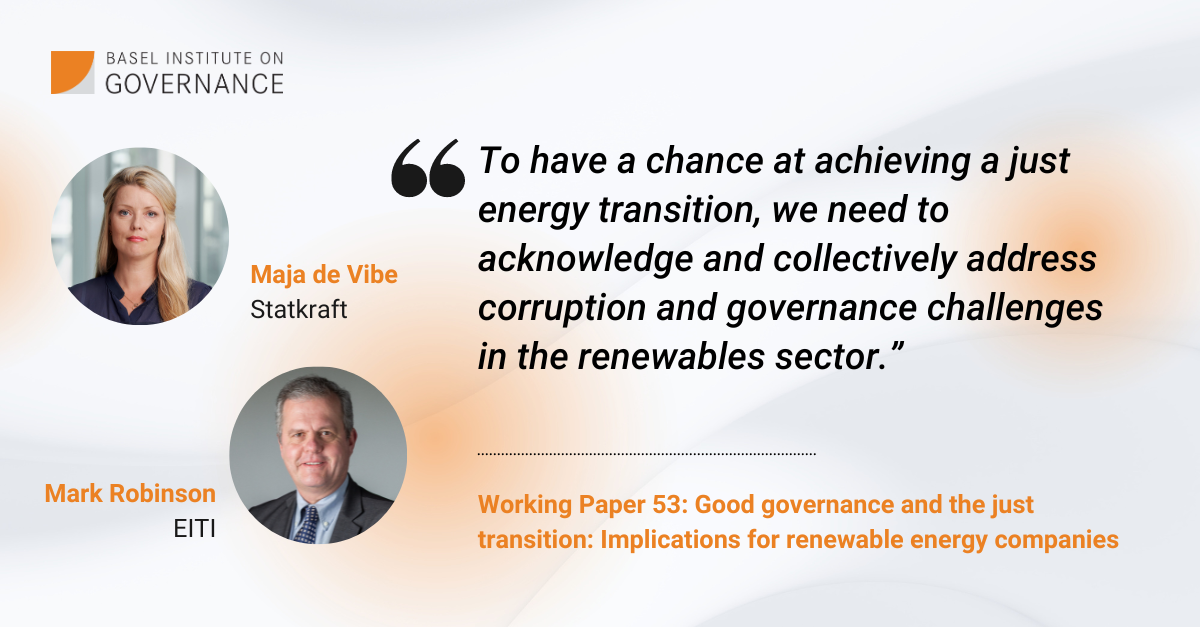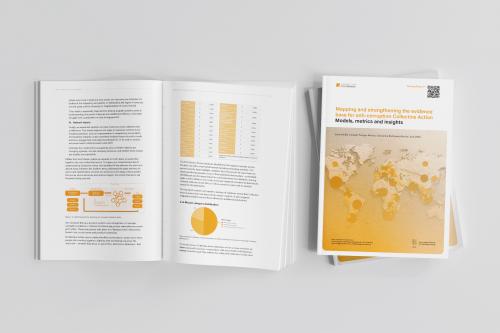Corruption and governance risks threaten a just energy transition – but there’s also good news

A landmark report has thrown light on corruption and governance risks facing the renewables sector. It urges industry-led collective action to develop effective safeguards and ensure a just energy transition for all.
In a Working Paper published by the Basel Institute on Governance, Maja de Vibe of Statkraft and Mark Robinson of the Extractive Industries Transparency Initiative reveal the extent of corruption and governance risks affecting investments in solar, wind, hydropower and green hydrogen projects.
Addressing these risks is vital to achieving an energy transition that benefits communities and society at large while generating sustainable, long-term economic value, they argue.
The authors call on industry leaders and other stakeholders to join together in collective action and learn from decades of experience addressing similar risks in the oil, gas and mining sectors.
Risks and consequences
Based on a company survey, interviews and available data, the paper reveals that significant risks exist around:
- A lack of transparency in the beneficial ownership of partners, contractors and suppliers.
- Opaque and irregular procedures for obtaining licences, contracts and land concessions.
- Inadequate community consultation, plus fraud and misappropriation of benefit funds.
- Misuse of subsidies and unethical tax practices.
As the sector is relatively new and highly fragmented, key accountability mechanisms like common reporting standards and disclosure requirements have yet to be developed.
Civil society engagement is low – and there is still a perception that “green is clean”.
Practical tools and lessons from oil, gas and mining
Through its Green Corruption programme, the Basel Institute works with key partners to bring the benefits of anti-corruption and governance expertise to address the environmental and climate crisis. Juhani Grossmann, who leads the programme, said:
“This landmark report reveals that the renewable energy sector faces a new constellation of all-too-familiar corruption risks. Given the ambitious energy transition plans of numerous countries, and the rapidly increasing levels of investment in the renewable energy sector, the potential impact of these risks could be devastating for the sector and the communities being served by these projects.”
The good news, he stressed in a foreword to the paper, is that powerful anti-corruption and governance tools already exist that can be applied to address the renewables sector’s specific risks.
Valuable practical lessons can also be derived from efforts to tackle corruption and poor governance in extractive industries like oil, gas and mining, spearheaded since 2003 by EITI and its members. A shared set of principles, a platform for multi-stakeholder action and a common standard setting out disclosure requirements would build a strong foundation for greater accountability and oversight.
Vanessa Hans, who spearheads the Basel Institute’s work with the private sector on anti-corruption Collective Action, emphasised that:
“Achieving a just energy transition will need stakeholders from across the industry, civil society, government and the anti-corruption community to work in a sustained and collaborative way to help shape the path ahead.”
View and download the paper here: Good governance and the just transition: Implications for renewable energy companies
Launch at New York Climate Week
The report will be formally launched on 25 September 2024 in New York at a roundtable of renewable sector leaders during Climate Week NYC.
Organised by the TAI Collaborative with the Basel Institute’s support, the invitation-only event will reflect on the findings and identify opportunities for advancing collective industry action. The Basel Institute’s President Peter Maurer will moderate.
If you would like to be part of the roundtable, either in person in New York or virtually, please complete this form and await confirmation from the organising committee.
More information
Maja de Vibe is Senior Vice President of Sustainability, Governance and Compliance at Statkraft, Europe’s largest renewable energy generator. Mark Robinson is Executive Director of the Extractive Industries Transparency Initiative (EITI), an international organisation which brings together governments, companies and civil society organisations to promote governance reforms in the energy and extractive sectors.
They wrote the paper in their personal capacity during a sabbatical at the Rockefeller Foundation Bellagio Residency Program in May 2024, following widespread consultations with industry leaders.



